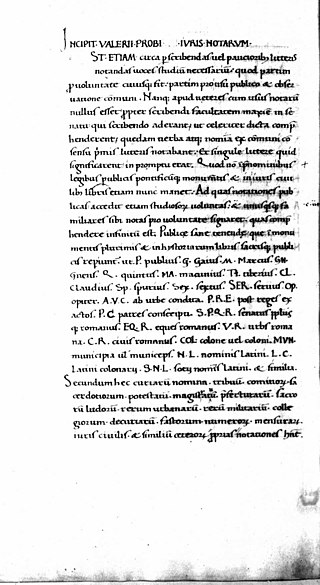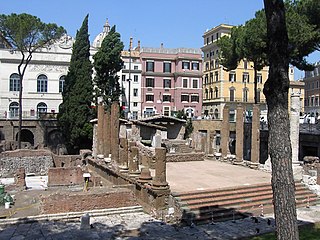Related Research Articles

Quintus Ennius was a writer and poet who lived during the Roman Republic. He is often considered the father of Roman poetry. He was born in the small town of Rudiae, located near modern Lecce, Apulia,, a town founded by the Messapians, and could speak Greek as well as Latin and Oscan. Although only fragments of his works survive, his influence in Latin literature was significant, particularly in his use of Greek literary models.

Publius Vergilius Maro, usually called Virgil or Vergil in English, was an ancient Roman poet of the Augustan period. He composed three of the most famous poems in Latin literature: the Eclogues, the Georgics, and the epic Aeneid. A number of minor poems, collected in the Appendix Vergiliana, were attributed to him in ancient times, but modern scholars consider his authorship of these poems as dubious.

Marcus Annaeus Lucanus, better known in English as Lucan, was a Roman poet, born in Corduba, in Hispania Baetica. He is regarded as one of the outstanding figures of the Imperial Latin period, known in particular for his epic Pharsalia. His youth and speed of composition set him apart from other poets.

Marcus Porcius Cato, also known as Cato the Censor, the Elder and the Wise, was a Roman soldier, senator, and historian known for his conservatism and opposition to Hellenization. He was the first to write history in Latin with his Origines, a now fragmentary work on the history of Rome. His work De agri cultura, a rambling work on agriculture, farming, rituals, and recipes, is the oldest extant prose written in the Latin language. His epithet "Elder" distinguishes him from his great-grandson Cato the Younger, who opposed Julius Caesar.

Classical Latin is the form of Literary Latin recognized as a literary standard by writers of the late Roman Republic and early Roman Empire. It was used from 75 BC to the 3rd century AD, when it developed into Late Latin. In some later periods, it was regarded as good or proper Latin, with following versions viewed as debased, degenerate, or corrupted. The word Latin is now understood by default to mean "Classical Latin"; for example, modern Latin textbooks almost exclusively teach Classical Latin.

Marcus Valerius Probus, also known as M. Valerius Probus Berytius or Probus the Berytian, was a Roman grammarian and critic, who flourished during Nero's reign.
Quintus Hortensius Hortalus was a famous Roman lawyer, a renowned orator and a statesman. Politically he belonged to the Optimates. He was consul in 69 BC alongside Quintus Caecilius Metellus Creticus. His nickname was Dionysia, after a famous actress. After his retirement Hortensius took up fish-breeding as a hobby. Cicero spoke of him as a Piscinarius – 'fish fancier'.
Gaius Valerius Flaccus was a 1st-century Roman poet who flourished during the "Silver Age" under the Flavian dynasty, and wrote a Latin Argonautica that owes a great deal to Apollonius of Rhodes' more famous epic.

The gens Valeria was a patrician family at ancient Rome, prominent from the very beginning of the Republic to the latest period of the Empire. Publius Valerius Poplicola was one of the consuls in 509 BC, the year that saw the overthrow of the Tarquins, and the members of his family were among the most celebrated statesmen and generals at the beginning of the Republic. Over the next ten centuries, few gentes produced as many distinguished men, and at every period the name of Valerius was constantly to be found in the lists of annual magistrates, and held in the highest honour. Several of the emperors claimed descent from the Valerii, whose name they bore as part of their official nomenclature.
Apollonius of Rhodes was an ancient Greek author, best known for the Argonautica, an epic poem about Jason and the Argonauts and their quest for the Golden Fleece. The poem is one of the few extant examples of the epic genre and it was both innovative and influential, providing Ptolemaic Egypt with a "cultural mnemonic" or national "archive of images", and offering the Latin poets Virgil and Gaius Valerius Flaccus a model for their own epics. His other poems, which survive only in small fragments, concerned the beginnings or foundations of cities, such as Alexandria and Cnidus places of interest to the Ptolemies, whom he served as a scholar and librarian at the Library of Alexandria. A literary dispute with Callimachus, another Alexandrian librarian/poet, is a topic much discussed by modern scholars since it is thought to give some insight into their poetry, although there is very little evidence that there ever was such a dispute between the two men. In fact almost nothing at all is known about Apollonius and even his connection with Rhodes is a matter for speculation. Once considered a mere imitator of Homer, and therefore a failure as a poet, his reputation has been enhanced by recent studies, with an emphasis on the special characteristics of Hellenistic poets as scholarly heirs of a long literary tradition writing at a unique time in history.

The Appendix Vergiliana is a collection of poems traditionally ascribed as being the juvenilia of Virgil.

Gaius Cornelius Gallus was a Roman poet, orator and politician.
The Neoterikoi or Neoterics were a series of avant-garde Latin poets who wrote in the 1st century BCE. Neoteric poets deliberately turned away from classical Homeric epic poetry. Rather than focusing on the feats of ancient heroes and gods, they propagated a new style of poetry through stories that operated on a smaller scale in regard to themes and setting.
The Cypria is a lost epic poem of ancient Greek literature, which has been attributed to Stasinus and was quite well known in classical antiquity and fixed in a received text, but which subsequently was lost to view. It was part of the Epic Cycle, which told the entire history of the Trojan War in epic hexameter verse. The story of the Cypria comes chronologically at the beginning of the Epic Cycle, and is followed by that of the Iliad; the composition of the two was apparently in the reverse order. The poem comprised eleven books of verse in epic dactylic hexameters.

The gens Lutatia, occasionally written Luctatia, was a plebeian family of ancient Rome. The first of the gens to obtain the consulship was Gaius Lutatius Catulus in 242 BC, the final year of the First Punic War. Orosius mentions their burial place, the sepulchrum Lutatiorum, which lay beyond the Tiber.

The gens Porcia, rarely written Portia, was a plebeian family at Ancient Rome. Its members first appear in history during the third century BC. The first of the gens to achieve the consulship was Marcus Porcius Cato in 195 BC, and from then until imperial times, the Porcii regularly occupied the highest offices of the Roman state.
Lucius Valerius Flaccus was a Roman politician and general. He was consul in 195 BC and censor in 183 BC, serving both times with his friend Cato the Elder, whom he brought to the notice of the Roman political elite.
Three main sets of works are attributed to Florus : Virgilius orator an poeta, an Epitome of Roman History and a collection of 14 short poems. As to whether these were composed by the same person, or set of people, is unclear, but the works are variously attributed to:
The poem Dirae is one of the poems that make up the Appendix Vergiliana. It is a pastoral poem, told from the perspective of a Sicilian herdsman forced to give up his land to Lycurgus, who is receiving this land as a reward for his participation in the Roman civil wars. The herdsman spends the entire poem cursing the land so Lycurgus cannot benefit from it.
References
- 1 2 3 4 One or more of the preceding sentences incorporates text from a publication now in the public domain : Chisholm, Hugh, ed. (1911). "Cato, Publius Valerius". Encyclopædia Britannica . Vol. 5 (11th ed.). Cambridge University Press. pp. 536–537.